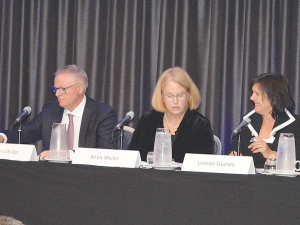Another Windfall for Fonterra Farmers, Unit Holders
Fonterra farmer shareholders and unit holders are in line for another payment in April.
 Fonterra chair Peter McBride, Anya Wicks, director governance, risk and audit and outgoing director Leonie Guiney at the AGM last week.
Fonterra chair Peter McBride, Anya Wicks, director governance, risk and audit and outgoing director Leonie Guiney at the AGM last week.
Fonterra leaders are making their case for offloading the co-operative's $3 billion consumer business, noting that its return on capital has been nowhere near respectable.
Speaking at the co-op's annual meeting in New Plymouth last week, both Fonterra chair Peter McBride and chief executive Miles Hurrell noted that shareholder approval is critical to the sale.
Fonterra's consumer business includes its Oceania and Sri Lankan operations and comprises household brands like Anchor and Mainland.
McBride noted that the sale of iconic brands might seem like a cold message to the many people that have an emotional connection to those brands.
"We understand that. Those brands and the associated assets that go with them do hold a lot of value, but to the right owner," he says.
"Fonterra, as a farmer-owned co-operative and the associated cost of capital that come with that model, is not the natural owner of a consumer business."
McBride points out that right now Fonterra estimates the weighted average cost for a dairy farmer is somewhere around 10%.
He says consumer businesses are inherently more capital intensive and riskier businesses to operate.
"Overlay that with the potentially higher geographic risk in the markets where our consumer businesses operate, and a respectable return on capital for the consumer business should be something north of 15%.
"Our Consumer business had one of its better years in 2024, but despite that, its return on capital was just 6.8%, up from 3.9% in 2023 and 0.2% in 2022.
"We cannot justify investing your money into a business that generates returns lower than your opportunity cost of capital, whilst at the same time exposing you to more risk. We are better off returning that capital to you, reinvesting it into the parts of our business where we have a comparative advantage, or a mixture of both."
Earlier thi month, the co-op announced that it has decided to proceed with the sale - exploring both a trade sale and initial public offering (IPO) options.
At the AGM, shareholder Chris Whiting, Waikato, questioned why the co-op was pursuing an IPO, where the consumer business could be floated on the stock exchange.
Fonterra chief executive Miles Hurrell replied that their advice was that it is important to keep options open.
"We will thoroughly test the terms and value of both a trade sale and IPO with the market before seeking support from farmer shareholders for a divestment option through a vote.
"A final decision on which divestment pathway to pursue will be based on several factors, including which optin will result in optimal long-term value for the co-op."
Hurrell noted that farmer shareholder support remains critical to proceeding with a divestment.
"We remain committed to presenting an option to you for a vote," he told the AGM.
"Before we do this, we need to thoroughly test the merits and value of both a trade sale and IPO, so that we can be clear on what we're seeking you to approve.
"I recognise there is significant interest in this process, and we will keep you updated as this work progresses. This is a pivotal time for the co-op. While we are confident in our strategic direction, we don't make decisions lightly. Every choice we make is grounded in what's in the best interests of our farmer shareholders."
Controls on the movement of fruit and vegetables in the Auckland suburb of Mt Roskill have been lifted.
Fonterra farmer shareholders and unit holders are in line for another payment in April.
Farmers are being encouraged to take a closer look at the refrigerants running inside their on-farm systems, as international and domestic pressure continues to build on high global warming potential (GWP) 400-series refrigerants.
As expected, Fonterra has lifted its 2025-26 forecast farmgate milk price mid-point to $9.50/kgMS.
Bovonic says a return on investment study has found its automated mastitis detection technology, QuadSense, is delivering financial, labour, and animal-health benefits on New Zealand dairy farms worth an estimated $29,547 per season.
Pāmu has welcomed ten new apprentices into its 2026 intake, marking the second year of a scheme designed to equip the next generation of farmers with the skills, knowledge, and experience needed for a thriving career in agriculture.

OPINION: Here w go: the election date is set for November 7 and the politicians are out of the gate…
OPINION: ECan data was released a few days ago showing Canterbury farmers have made “giant strides on environmental performance”.